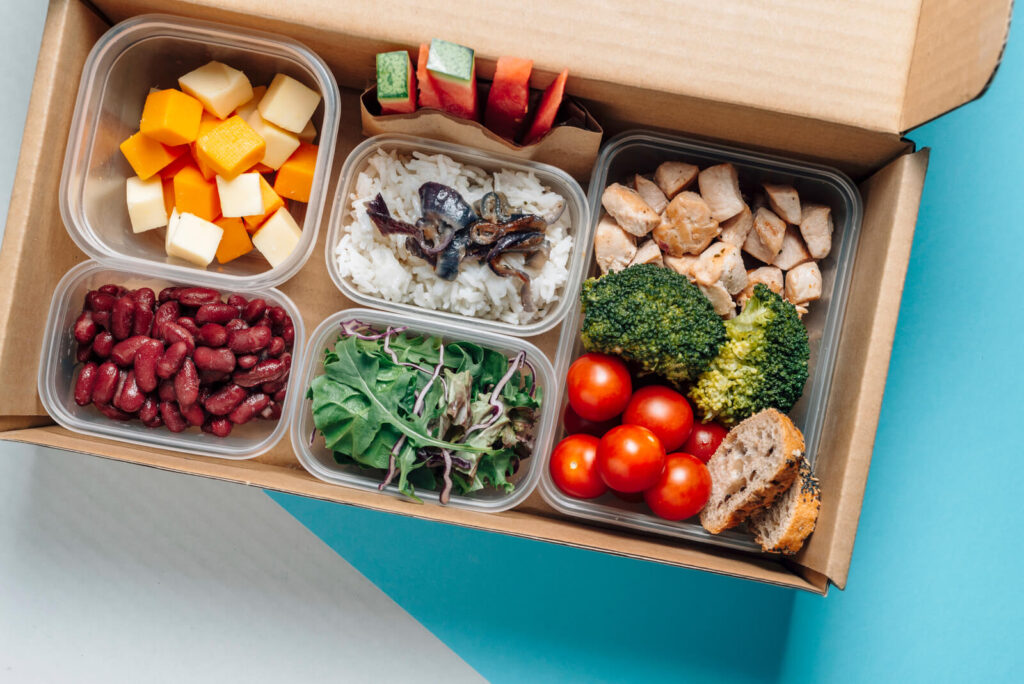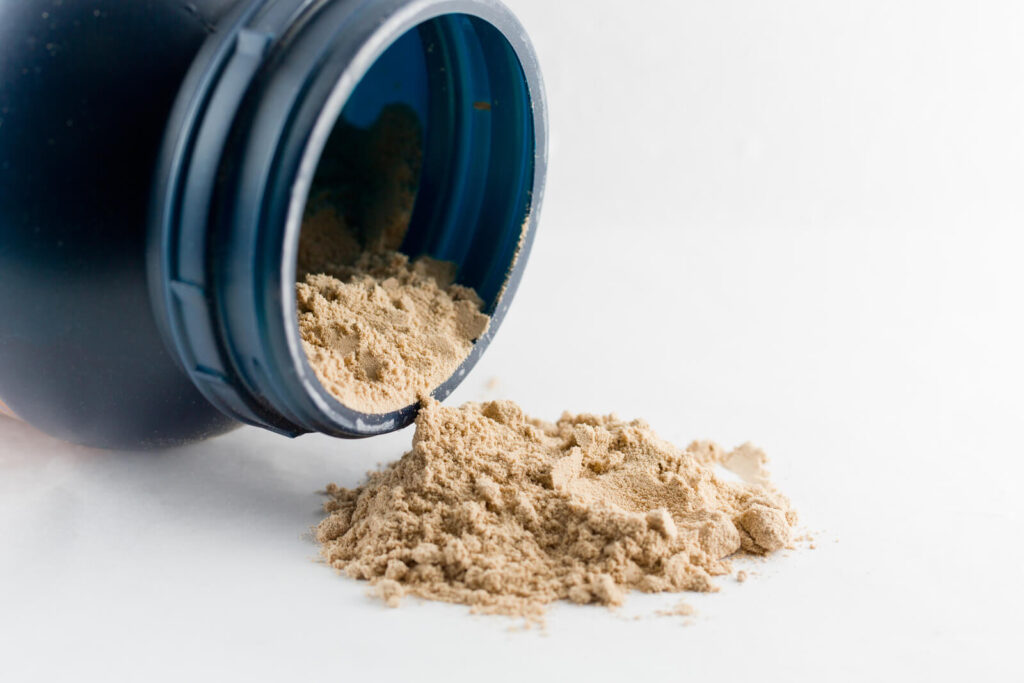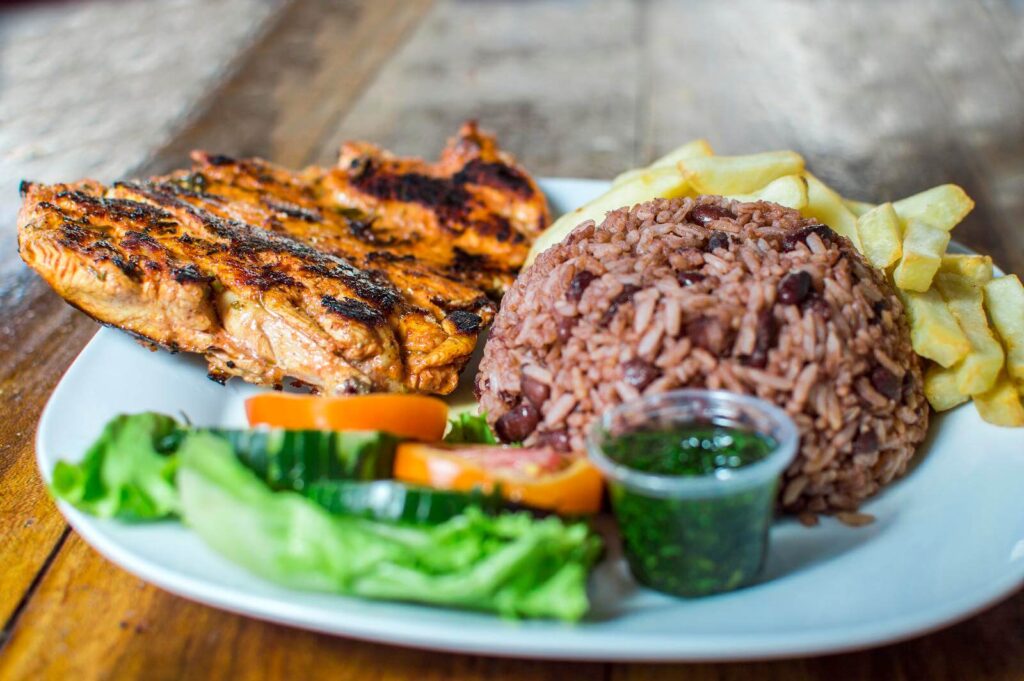Is real food better than protein powder

Picture this: you’re at the gym, wrapping up a rigorous workout session, and suddenly you’re faced with a critical decision – should you reach for that trusty tub of protein powder or opt for a wholesome meal instead?
When considering whether to consume protein powder or real food, it’s essential to weigh the nutritional benefits and potential drawbacks of each option.
While protein powder offers convenience and concentrated protein content, whole foods provide a broader spectrum of nutrients crucial for overall health.
By the end of this article, you’ll not only understand the nuances of the protein powder vs. real food dilemma but also gain actionable advice to make informed decisions for your health and fitness journey.
In today’s fast world, people often choose what’s easy over what’s healthy. Many individuals turn to protein powder as a quick fix to meet their daily protein requirements, but is this shortcut sacrificing overall health and well-being? We’ll explore the potential pitfalls of relying solely on protein powder and shed light on the importance of a balanced diet comprising whole, nutrient-dense foods.
While protein powder can serve as a convenient supplement, it should not overshadow the nutritional richness of real foods. Our bodies thrive on a diverse array of nutrients, vitamins, and minerals found abundantly in whole foods. We’ll delve into the science behind why a balanced diet, supplemented by protein powder when necessary, is the optimal approach for sustained health and vitality.
Navigating the protein powder vs. real food debate requires a nuanced understanding of individual dietary needs and lifestyle factors. We’ll provide practical tips and strategies to seamlessly incorporate both protein powder and whole foods into your daily routine, ensuring you strike the perfect balance for optimal nutrition and performance.
In this comprehensive guide, we delve deep into this age-old question, providing clarity and insights to empower your nutritional choices.
Protein powder vs balanced diet

Protein Powder:
Convenient source of protein supplementation, particularly for individuals with busy lifestyles or increased protein needs.
It may lack essential vitamins, minerals, and fiber found in whole foods, necessitating supplementation with a balanced diet.
Balanced Diet:
Emphasizes the consumption of whole, nutrient-dense foods like fruits, vegetables, lean proteins, and whole grains.
Provides a comprehensive array of nutrients crucial for optimal health, including vitamins, minerals, antioxidants, and dietary fiber.
Is it better to take protein powder or eat real food
When deciding between protein powder and real food, it’s important to think about what each one offers. Here’s a bit more detail:
Protein Powder:
- Convenience: Protein powder is easy to use and can be quickly mixed into shakes or smoothies.
- Concentrated Protein: It provides a high amount of protein per serving, which can be beneficial for muscle repair and growth.
- Options: There are many types of protein powder available, such as whey, casein, and plant-based options, allowing for flexibility based on dietary preferences or restrictions.
Real Food:
- Nutrient Variety: Whole foods like lean meats, fish, eggs, dairy, legumes, nuts, seeds, fruits, and vegetables offer a wide range of nutrients beyond just protein, including vitamins, minerals, fiber, and antioxidants.
- Satiety: Real food tends to be more filling and satisfying compared to liquid protein shakes, which can help regulate appetite and prevent overeating.
- Digestive Health: Whole foods contain natural fibers and enzymes that support digestion and gut health, which may be lacking in some protein powders.
Unflavored Protein Powder vs Flavored

- Unflavored Protein Powder:
- Offers versatility in culinary applications, allowing for incorporation into various recipes without altering taste profiles.
- Often free from added sugars, artificial sweeteners, and flavors, making it a suitable option for individuals prioritizing natural ingredients.
- Flavored Protein Powder:
- Appeals to those seeking palatability and variety, with a wide range of flavors available on the market.
- May contain added sugars, artificial sweeteners, or flavors, which could contribute to excess calorie intake and potential health concerns if consumed excessively.
Can I Live off Protein Shakes
- Dependency on Protein Shakes:
- Relying solely on protein shakes for sustenance may lead to nutritional deficiencies and imbalances, as they lack the diverse array of nutrients found in whole foods.
- Long-term dependence on protein shakes may compromise metabolic health, digestive function, and overall well-being, emphasizing the importance of dietary variety and balance.
- Balanced Approach:
- Incorporate protein shakes as part of a balanced diet, complementing whole foods to meet protein needs while ensuring adequate intake of essential nutrients.
- Prioritize whole, nutrient-dense foods as the foundation of your diet, utilizing protein shakes as convenient supplements rather than meal replacements.
Is Protein Powder Bad for Your Gut

- Impact on Gut Health:
- Certain individuals may experience digestive discomfort, bloating, or gastrointestinal distress when consuming protein powder, particularly if they have sensitivities or intolerances.
- Factors such as protein source, quality, and processing methods can influence gut tolerance, with some protein powders containing additives or allergens that may exacerbate symptoms.
- Mitigating Potential Risks:
- Opt for high-quality protein powders made from clean ingredients, free from additives, fillers, or artificial ingredients.
- Monitor personal tolerance levels and adjust consumption accordingly, considering individual digestive health and dietary preferences.
Do I Need Protein if I Eat a Lot of Protein
- Protein Requirements:
- Even individuals consuming high-protein diets may benefit from protein supplementation to support muscle repair, recovery, and growth, particularly during periods of increased physical activity or calorie restriction.
- However, excessive protein intake beyond individual needs may not confer additional benefits and could potentially strain kidney function or contribute to nutrient imbalances.
- Optimal Intake:
- Aim to meet protein needs through a combination of whole foods and supplements, ensuring balance and variety in dietary sources while considering individual goals and preferences.
- Consult with a healthcare professional or registered dietitian to determine personalized protein requirements and optimize dietary choices accordingly.
Can You Drink 2 Different Protein Shakes a Day

- Frequency of Protein Shake Consumption:
- Drinking multiple protein shakes per day may be appropriate for individuals with increased protein requirements, such as athletes or those undergoing intense training.
- However, excessive reliance on protein shakes as meal replacements or snacks may displace whole foods and compromise overall dietary diversity and nutrient intake.
- Considerations:
- Balance protein shake consumption with a varied diet rich in whole foods to ensure adequate intake of essential nutrients, vitamins, and minerals.
- Consult with a healthcare professional or registered dietitian to assess individual protein needs and optimize dietary choices for health and performance.
Can I Eat Chicken Instead of Protein Shake

- Whole Food Alternatives:
- Chicken serves as an excellent source of lean protein, offering a complete amino acid profile along with essential vitamins and minerals crucial for overall health.
- Incorporating chicken and other protein-rich foods into your diet provides nutritional benefits beyond protein supplementation, including satiety, satisfaction, and metabolic support.
- Considerations:
- While chicken can be a nutritious alternative to protein shakes, it’s essential to balance dietary choices and incorporate a variety of foods to meet overall nutrient needs and promote dietary diversity.
- Customize your diet based on individual preferences, lifestyle factors, and nutritional goals, aiming for a balanced approach that prioritizes whole, minimally processed foods.
What Are the Side Effects of Taking Protein Powder
- Potential Side Effects:
- Digestive discomfort, bloating, or gas may occur in some individuals, particularly if protein powders contain additives, allergens, or low-quality ingredients.
- Excessive protein intake from supplements may strain kidney function or contribute to dehydration if adequate hydration is not maintained.
- Mitigating Risks:
- Choose high-quality protein powders with minimal additives and allergens to reduce the risk of adverse reactions.
- Stay hydrated and consume protein supplements in moderation, considering individual dietary needs and health status.
What Happens if You Don’t Workout with Protein Powder
- Role of Protein Powder:
- Protein powder serves as a convenient source of protein supplementation, particularly for individuals seeking to support muscle repair, recovery, and growth following exercise.
- However, the necessity of protein powder depends on individual dietary habits, protein requirements, and fitness goals, with whole foods also offering viable options for meeting protein needs.
- Dietary Considerations:
- In the absence of workouts, protein powder may not be essential, as protein needs can often be met through a balanced diet comprising whole foods rich in protein sources like lean meats, poultry, fish, legumes, and dairy products.
- Prioritize dietary variety and nutrient-dense foods to support overall health and well-being, adjusting protein intake based on activity level, age, gender, and individual metabolic needs.
Can i use whey protein in fasting
Yes, you can use whey protein during fasting, but it’s essential to consider how it may affect your fasting goals and metabolic state. Incorporating whey protein into your fasting routine can help maintain muscle mass, support satiety, and provide essential amino acids without significantly impacting insulin levels.
- Whey protein can be consumed during the fasting window without breaking the fast, as it contains minimal calories and carbohydrates.
- It can help preserve lean muscle mass and aid in fat loss, making it a valuable addition to intermittent fasting protocols.
- Whey protein is rapidly absorbed, making it an ideal choice for post-workout consumption during fasting periods to support muscle recovery and growth.
- However, be mindful of flavored whey protein powders that may contain added sugars or artificial sweeteners, which could potentially disrupt fasting benefits.
- Opt for unflavored or naturally sweetened whey protein options to minimize the risk of breaking your fast while still reaping the benefits of protein supplementation.
- Consult with a healthcare professional or registered dietitian to determine the most suitable approach to incorporating whey protein into your fasting regimen based on your individual goals and dietary needs.
What is a high protein breakfast for intermittent fasting
A high-protein breakfast for intermittent fasting can help sustain energy levels, promote satiety, and support muscle maintenance during the fasting window. Incorporate foods like eggs, Greek yogurt, lean meats, and protein shakes to ensure you’re getting an adequate amount of protein to start your day while still adhering to your fasting schedule.
- Eggs are a versatile option rich in protein and essential nutrients.
- Greek yogurt provides a creamy, protein-packed base with probiotics for gut health.
- Lean meats like turkey or chicken offer a savory protein source with minimal fat.
- Protein shakes made with whey or plant-based protein powder provide a convenient option for a quick breakfast on the go.
- Incorporate nut butter for a protein and fiber-rich spread to pair with whole grain toast or fruit.
- Consider incorporating a combination of these high-protein foods to create a well-rounded breakfast that supports your intermittent fasting goals.
